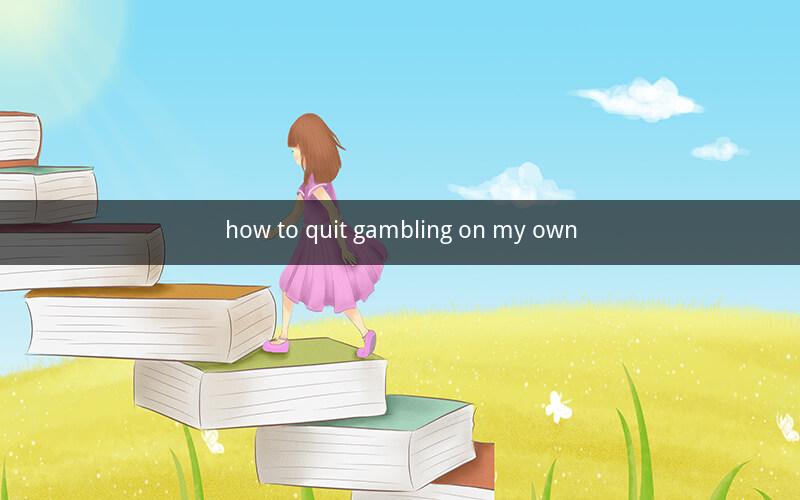
Table of Contents
1. Understanding the Importance of Quitting
2. Identifying the Reasons for Quitting
3. Developing a Personalized Quitting Plan
4. Setting Realistic Goals
5. Seeking Support from Friends and Family
6. Utilizing Professional Help
7. Overcoming Triggers and Cravings
8. Finding Alternative Activities
9. Celebrating Successes
10. Maintaining Long-Term Sobriety
1. Understanding the Importance of Quitting
Gambling addiction can be a destructive force in one's life, leading to financial, emotional, and social problems. Understanding the importance of quitting is the first step towards breaking free from this harmful habit. Recognize the negative impact gambling has had on your life and commit to making a change.
2. Identifying the Reasons for Quitting
Identifying the reasons why you want to quit can provide you with motivation and clarity. Consider the following questions:
- Are you spending too much time and money on gambling?
- Has your gambling affected your relationships with loved ones?
- Are you experiencing financial difficulties due to gambling?
- Do you feel a sense of loss of control when gambling?
Understanding the reasons behind your desire to quit can help you stay focused and committed to your goal.
3. Developing a Personalized Quitting Plan
Creating a personalized quitting plan will help you stay organized and focused. Consider the following steps:
- Set a quit date: Choose a date that is realistic and manageable for you.
- Identify triggers: Understand what situations or emotions lead you to gamble.
- Develop coping strategies: Plan how you will deal with triggers and cravings.
- Monitor your progress: Keep track of your progress and adjust your plan as needed.
4. Setting Realistic Goals
Setting realistic goals will help you stay on track and celebrate your successes. Consider the following:
- Set short-term and long-term goals: Break your quitting journey into smaller, achievable milestones.
- Track your progress: Keep a journal or use an app to monitor your progress.
- Celebrate achievements: Reward yourself for reaching your goals.
5. Seeking Support from Friends and Family
Seeking support from friends and family can provide you with emotional support and encouragement. Consider the following:
- Communicate your decision: Share your plans with your loved ones and ask for their support.
- Establish boundaries: Set clear boundaries with those who may enable your gambling behavior.
- Spend time with supportive individuals: Surround yourself with positive influences.
6. Utilizing Professional Help
If you're struggling to quit on your own, consider seeking professional help. A therapist or counselor can provide you with personalized guidance and support. Consider the following:
- Find a therapist: Look for a therapist who specializes in gambling addiction.
- Attend therapy sessions: Commit to attending regular therapy sessions to work on your recovery.
- Explore support groups: Join a support group for individuals struggling with gambling addiction.
7. Overcoming Triggers and Cravings
Triggers and cravings are common challenges when trying to quit gambling. Consider the following strategies:
- Identify and avoid triggers: Stay away from places or situations that may trigger your gambling behavior.
- Practice mindfulness: Learn to stay present and grounded, reducing the likelihood of giving in to cravings.
- Use distraction techniques: Find healthy ways to distract yourself when cravings arise.
8. Finding Alternative Activities
Finding alternative activities can help you fill the void left by gambling. Consider the following options:
- Pick up a new hobby: Try something new that interests you, such as painting, cooking, or gardening.
- Exercise: Engage in physical activities that promote well-being, such as yoga, running, or cycling.
- Spend time with loved ones: Strengthen your relationships with friends and family by spending quality time together.
9. Celebrating Successes
Celebrating your successes is an essential part of the quitting journey. Consider the following:
- Acknowledge your progress: Take pride in the progress you've made towards quitting.
- Set new goals: Continue to set and achieve new goals to maintain your motivation.
- Share your story: Share your experiences with others who may be struggling with gambling addiction.
10. Maintaining Long-Term Sobriety
Maintaining long-term sobriety is crucial for a successful recovery. Consider the following:
- Stay committed: Continue to work on your recovery and maintain your commitment to quitting.
- Stay connected: Remain involved in support groups and maintain relationships with supportive individuals.
- Be prepared for relapse: Understand that relapse is a possibility and know how to handle it when it occurs.
Questions and Answers
1. What is the most important step in quitting gambling on my own?
- Understanding the importance of quitting and committing to making a change is the most important step.
2. How can I identify the reasons for quitting?
- Reflect on the negative impact gambling has had on your life and consider questions related to time, money, relationships, and control.
3. What should I include in a personalized quitting plan?
- Set a quit date, identify triggers, develop coping strategies, monitor progress, and establish boundaries.
4. How can I set realistic goals?
- Set short-term and long-term goals, track progress, and celebrate achievements.
5. Why is seeking support from friends and family important?
- Support from loved ones can provide emotional support, encouragement, and accountability.
6. What types of professional help are available for gambling addiction?
- Consider therapists, counselors, support groups, and treatment centers specializing in gambling addiction.
7. How can I overcome triggers and cravings?
- Identify and avoid triggers, practice mindfulness, and use distraction techniques.
8. What alternative activities can I try to fill the void left by gambling?
- Explore hobbies, exercise, and spending time with loved ones.
9. How can I celebrate my successes?
- Acknowledge progress, set new goals, and share your story.
10. What can I do to maintain long-term sobriety?
- Stay committed, stay connected, and be prepared for relapse.